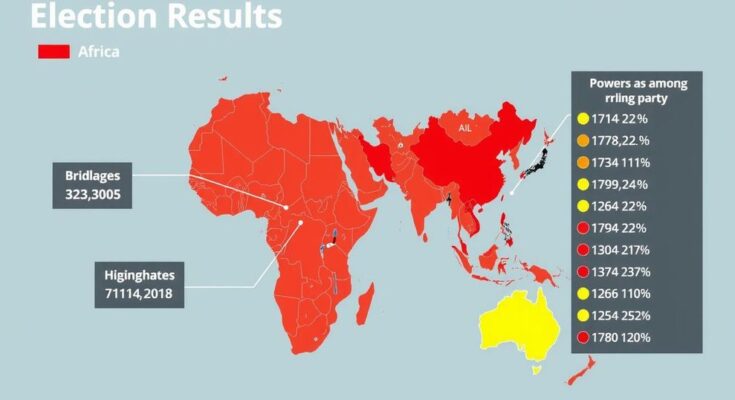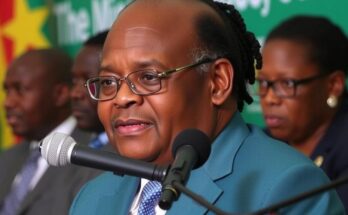The 2024 elections in Africa resulted in varied outcomes, with some ruling parties retaining power while others faced significant defeats. Notable events included the re-election of Comoros’ President Assoumani, Frelimo’s continued dominance in Mozambique, and the historical opposition victory in Botswana. South Africa’s ANC lost its majority, Ghana saw John Mahama’s return amid economic concerns, and Senegal elected a young president, while elections in the Sahel were postponed due to military rule.
In 2024, over a dozen African nations held democratic elections, showcasing a mix of outcomes. In the Comoros, President Azali Assoumani secured his fourth term following elections marred by violence, as opposition claims led to protests. Mozambique’s ruling Frelimo party continued its dominance despite widespread discontent and allegations of election fraud. Notably, Namibia’s SWAPO maintained power by electing its first female president, amidst claims of electoral faults. Conversely, Botswana saw a historic opposition victory, marking a significant political shift. In South Africa, the ANC, which has governed since the end of apartheid, was compelled to form a coalition government due to its failure to secure a majority amidst public dissatisfaction.
In East Africa, Rwanda’s President Paul Kagame claimed an overwhelming electoral victory, although concerns about democracy were raised. Ghana experienced a significant electoral turnaround with John Mahama defeating the ruling party candidate, driven largely by economic issues. Senegal’s political landscape shifted with Bassirou Diomaye Faye emerging as the youngest president after a politically charged environment. In contrast, the Sahel region experienced postponed elections amidst ongoing military rule, further restricting democratic processes and media freedom.
The political climate across Africa in 2024 was characterized by dynamic electoral processes that both reinforced and challenged existing political structures. The results of these elections varied significantly, revealing underlying tensions within many nations. Ruling parties in countries such as Mozambique and Namibia managed to maintain their hold on power, while unexpected victories by opposition parties indicated a deeper public desire for change, particularly in long-standing regimes. The elections reflected a complex interplay of economic grievances, calls for democratic reforms, and the influence of previous government actions on voter sentiment across the continent.
The 2024 elections in Africa illustrated a diverse political landscape characterized by both stability and upheaval. While some incumbents successfully secured their positions amid claims of electoral fraud and dissatisfaction, others faced surprising defeats by opposition parties. The outcomes reflected significant public discontent regarding governance issues, particularly in relation to economic performance and corruption. The ongoing challenges in the Sahel further highlighted the fragility of democratic processes in the region.
Original Source: www.voanews.com




